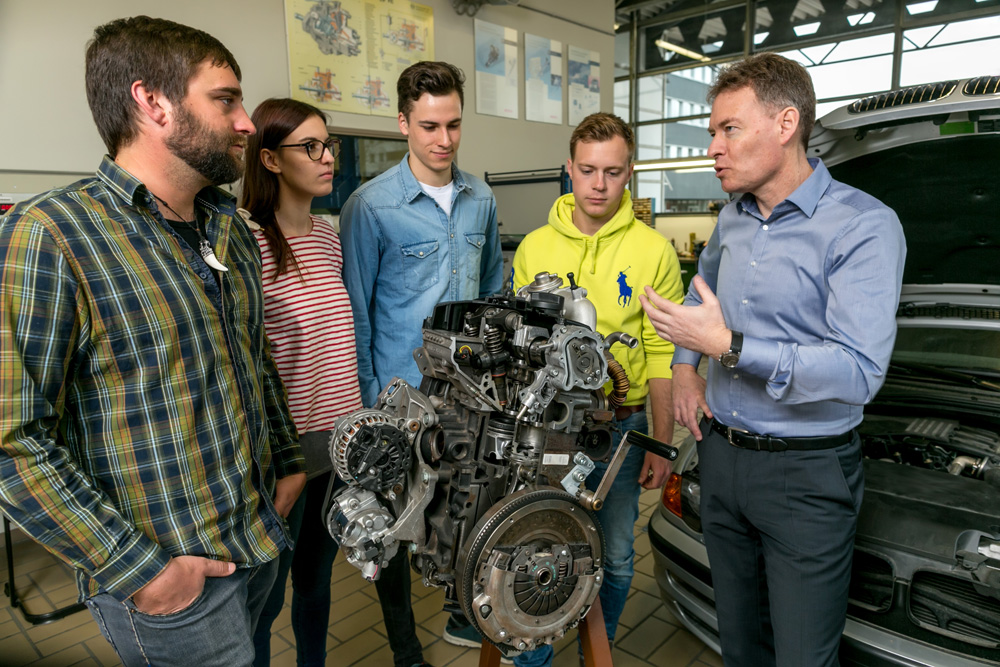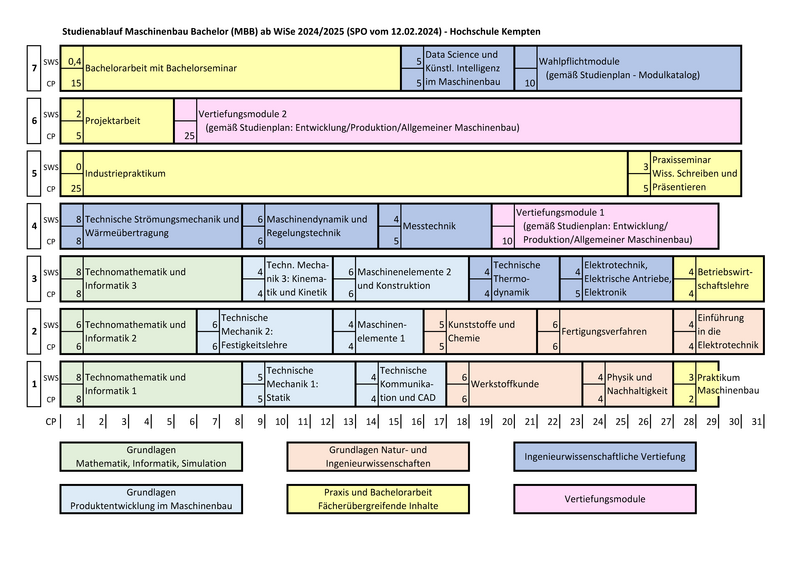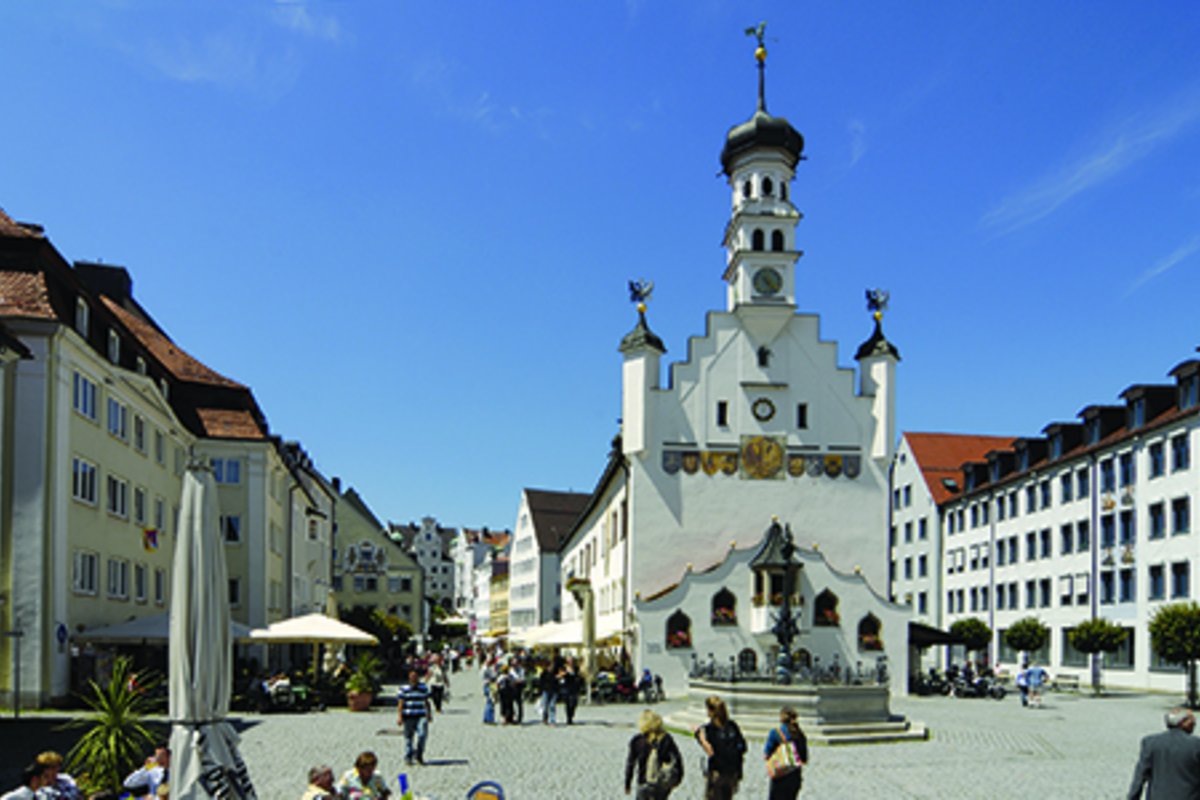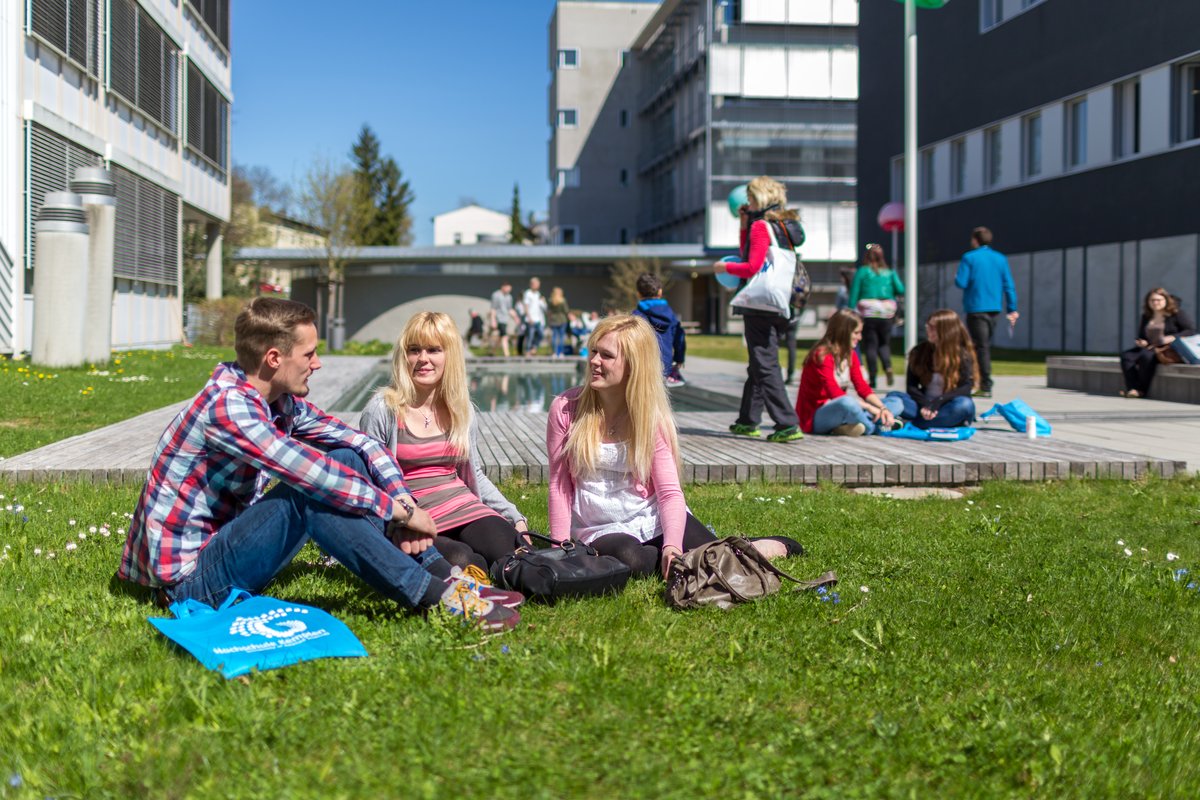
You are curious about how the products around you work and how they are manufactured. You want to improve these products, design and produce them more efficiently or in a more resource-friendly way.
You want to realise new ideas together with people locally and around the world. You want to choose from a wide range of well-paid jobs?
Then get started with a degree in mechanical engineering and shape the technology world of tomorrow! With broad knowledge in the fields of applied physics, technical maths and computer science, your degree will open the doors to numerous lucrative industries: Automotive engineering, machine tools, drive technology, conveyor systems, agricultural machinery, construction machinery, pumps and compressors, refrigeration and air technology, food processing machinery, plastics processing, household appliances, etc.
As early as the first semester, you will experience the practical work of engineers in the faculty's laboratories: You will see how varied your career will be and immediately establish contacts with students, staff and professors at your university.
Specialisation
After the 2nd semester, you can transfer to the Bachelor's degree programme in Vehicle Engineering without any losses, with full crediting of ECTS points earned to date: The modules of the basic mechanical engineering programme are equivalent.
After the 3rd semester, you choose the specialisation Development or Production, each with optimally coordinated modules
We support you in your studies right from the start with tutorials, small learning groups, special programmes for students and intensive support for internships and final theses. We offer a preliminary maths course especially for students in the first semester of technical bachelor’s degree programmes.
You can also expect a strong practical focus in what you learn, opportunities for team work and an inspiring atmosphere on campus.
At a glance
Award
Bachelor of Engineering (B. Eng.)
Study mode
full-time, dual
Standard duration
7
ECTS credits
210
Starts
winter semester
Restricted admission
no
Taught in
German
Faculty
Mechanical Engineering
Study abroad
optional
Accreditation
ASIIN
Details about this course
In the foundation course (semesters 1 and 2 you will familiarise yourself with the technical and scientific basics and get to know the job description of a mechanical engineer in practice.
The advanced course (3rd to 7th semester) includes a practical semester (5th semester). During the 3rd and 4th semester, you will learn further core skills in mechanical engineering, before move on to very practically focused and advanced modules in the 6th and 7th semester.
With our perfectly coordinated specialisation module packages (35 ECTS credits in total) for the 4th and 6th semesters, you can expand your knowledge according to your interests. You can currently choose between the specialisations Development and Production. If you prefer to mix modules, you can study general mechanical engineering. A further 10 ECTS are taken from a catalogue of compulsory elective modules.
In the practical semester (5th semester), you will learn the ropes of professional engineering by tackling practical tasks. The spectrum ranges from design, simulation and testing in development and production to sales and consulting.
At the end of your degree programme, you will complete your bachelor's thesis: As a rule, you will work on a current topic from an industrial company and thus establish contacts with a potential future employer. Alternatively, there are also assignments for you to work on at the university.
Upon successfully completing the programme, the university of applied sciences will award you the academic degree of Bachelor of Engineering (B.Eng.).
Would you like to combine study and practice? With pleasure! Kempten University of Applied Sciences offers you the following dual study options:
- studies with in-depth practical experience – practical and flexible! In the study programme with in-depth practice, a regular Bachelor's programme at the university is combined with intensive practical phases at the practice partner, based on the study content. Students can enter this dual study option up to the 4th semester.
- combined studies – a practical combination of study and work! With a combined study programme, you can acquire a fully recognised vocational qualification within your Bachelor's degree. This double qualification is particularly attractive for many companies!
You can find more information about the offers here.
Professional environment:
Mechanical engineering and vehicle construction are Germany’s biggest sectors with the greatest exports. The key areas of employment for mechanical engineers include vehicle engineering, powered mechanical equipment, energy supply and production engineering.
Besides these, there are numerous, interdisciplinary fields of activity that call for knowledge of electrical engineering, chemistry, computer science or business administration.
Career prospects:
Mechanical engineering graduates can apply their multifaceted skills in numerous areas of activity, securing them outstanding future prospects. Further afield, numerous new tasks are also emerging throughout the service sector, such as in environmental protection, energy generation from renewable sources or software development, thus expanding the range of appealing career prospects. A bachelor’s degree in mechanical engineering will secure you top opportunities in the Allgäu or elsewhere in Germany – even on the international stage.
Fields of activity:
- Agricultural and construction machinery
- Energy supply
- Materials engineering
- Medical technology
- Paper-making and printing machinery
- Plastics engineering
- Powered mechanical equipment
- Process and environmental engineering
- Production engineering
- Software development
- Vehicle Engineering
Application process:
We have pooled all the information and details you might need about applying and the admission requirements .
About you:
Are you keen on technology, have a good sense of mechanical processes and are interested in maths and physics? If so, you’re on just the right track to study Mechanical Engineering!
We ascribe to the values of openness, tolerance and acceptance. Our aim is to teach everyone studying at Kempten University of Applied Sciences about education in an international context. As part of this, we support university-wide, inter-faculty measures to promote international projects and cross-cultural interaction.
Are you interested in learning more about our international aspirations and the options for you to study abroad? Take a look at the information posted in our portal.
- [Translate to English:] Flyer Bachelor Maschinenbau ( 516 KB / pdf)
We compile all study programme and examination regulations centrally for you. There you will find all versions and changes. continue
Course structure
Detailed module descriptions can be found in the current Module Handbook.
In the foundation course (semesters 1 and 2) you will familiarise yourself with the technical and scientific basics and get to know the job description of a mechanical engineer in practice.
The advanced course (3rd to 7th semester) includes a practical semester (5th semester). In the 3rd and 4th semesters, you will learn advanced core competences in mechanical engineering, followed by highly practical modules in the 6th and 7th semesters.
With our perfectly coordinated specialisation module packages (35 ECTS credits in total) for the 4th and 6th semesters, you can expand your knowledge according to your interests. You can currently choose between the specialisations Development and Production. If you prefer to mix modules, you can study general mechanical engineering. A further 10 ECTS are taken from a catalogue of compulsory elective modules.
Decide on your own individual path:
Development specialisation
You are particularly interested in designing innovative products, systems or technologies, optimising them and bringing them to market maturity. You combine technical knowledge with creative problem-solving approaches and work closely with design, prototyping and testing.
Typical tasks include concept development, simulation, prototype construction and product optimisation, taking into account functionality, costs and quality.
Specific content (35 ECTS) for this specialisation ...
in the 4th semester:
- Computer Aided Engineering FEM and CFD
Computer-aided simulation of structural mechanics, flow and heat transfer - Product development
Creativity, component design, methodology, workflow, ergonomics, tolerancing process
in the 6th semester:
- Operationally stable design and validation of components
Stress state, load case determination, fatigue and operational strength, prototype versus series; determination of the stress tensor with strain gauges, test bench configuration, endurance test - Materials engineering
Material selection according to requirements, corrosion, damage analysis - Design of Experiments
Automated test planning and execution in the development process - Mechatronic systems
System scaling; Electromechanical, pneumatic and hydraulic drives; sensor and actuator technology, energy harvesting - Tribology
Friction, wear, lubrication, sealing - Turbomachinery
Centrifugal pumps, hydraulic systems, pump systems, turbines, turbochargers - Reciprocating engines
Reciprocating engine mechanics, combustion engines, mixture formation, compressors, applied thermodynamics Development
Production specialisation
You are particularly interested in planning the production of products, optimising and monitoring manufacturing processes in order to increase the efficiency and quality of production.
Specific content (35 ECTS) for this specialisation ...
in the 4th semester:
- Machine vision
Cameras and optical sensors, image evaluation, typical applications in production technology - Robotics and assembly
Structure and applied kinematics, applications, pick and place (gripping and positioning systems), cobots (collaborative robots), assembly technology
in the 6th semester:
- Machine tools and FEM
Machines and manufacturing systems, assemblies, requirements, calibration, FEM applications in the field of machine tools (computer-aided simulation) - Automation and control technology
Numerical control (NC, numerical control), servo drives, programmable logic controller (PLC), digital twin, data bus - Production planning
Production organisation, work planning, scheduling and order planning - Quality management (QM)
Methods and tools - Selected modern manufacturing processes
in the fields of forming, surface technology, micro manufacturing, additive manufacturing, joining
Student advisory service
We know how exciting the prospect of going to university can be.
So we want you to know whom you can get in touch with if you have any questions about studying with us – whether they’re about the degree programme, applying or anything else.
If so, please don’t hesitate to contact the university’s central Student Advisory Service or an academic advisor.
Bischoff, Gregor, Prof. Dr.




